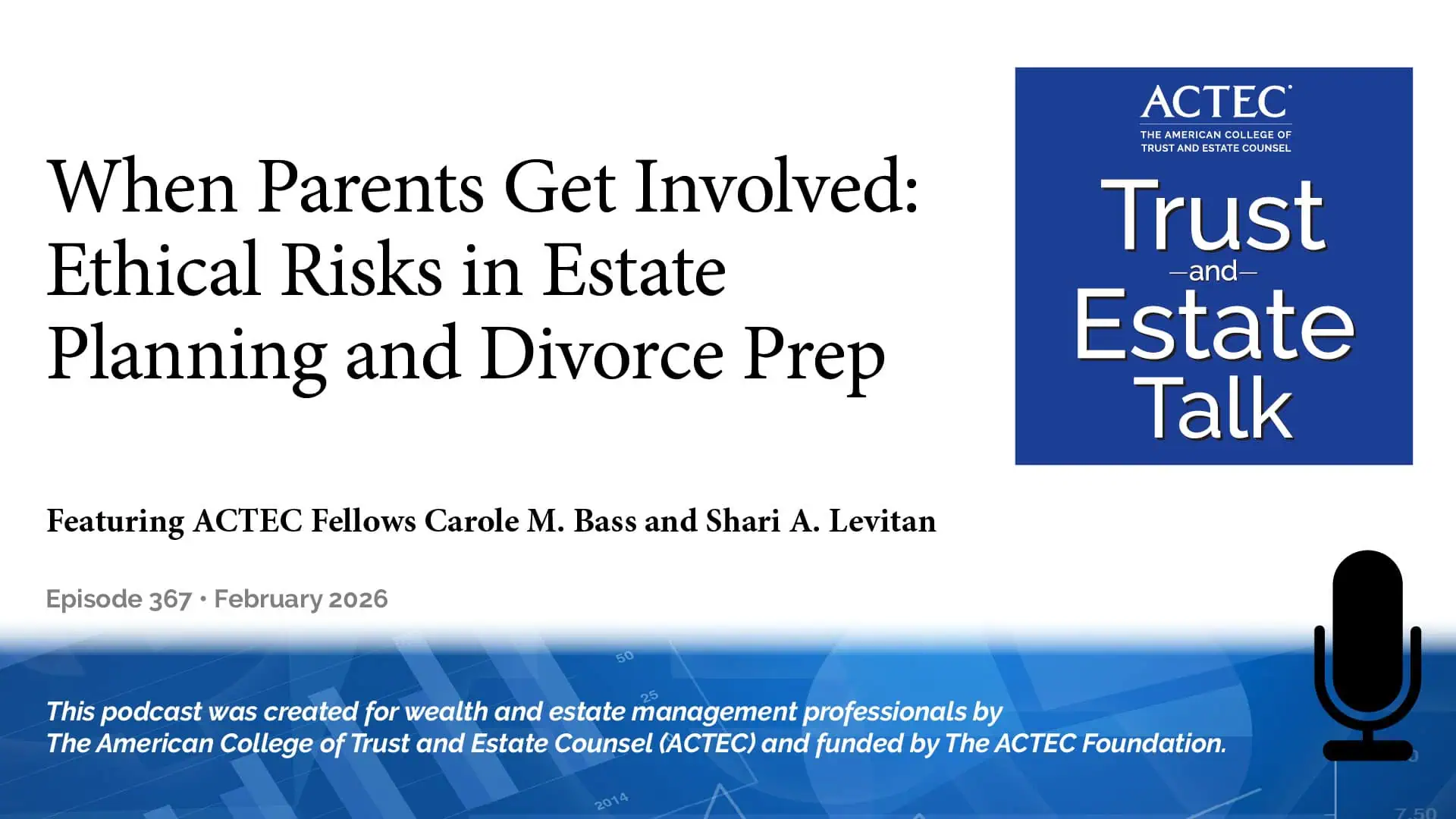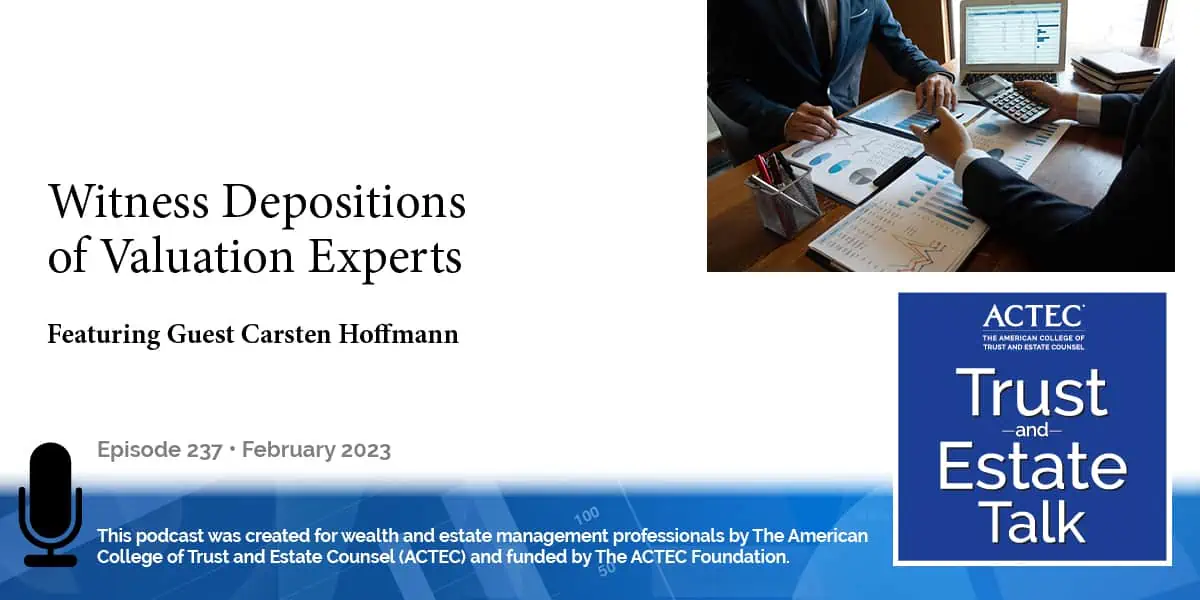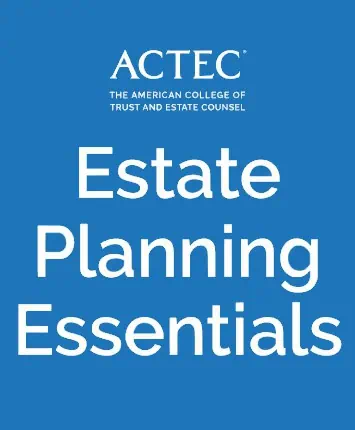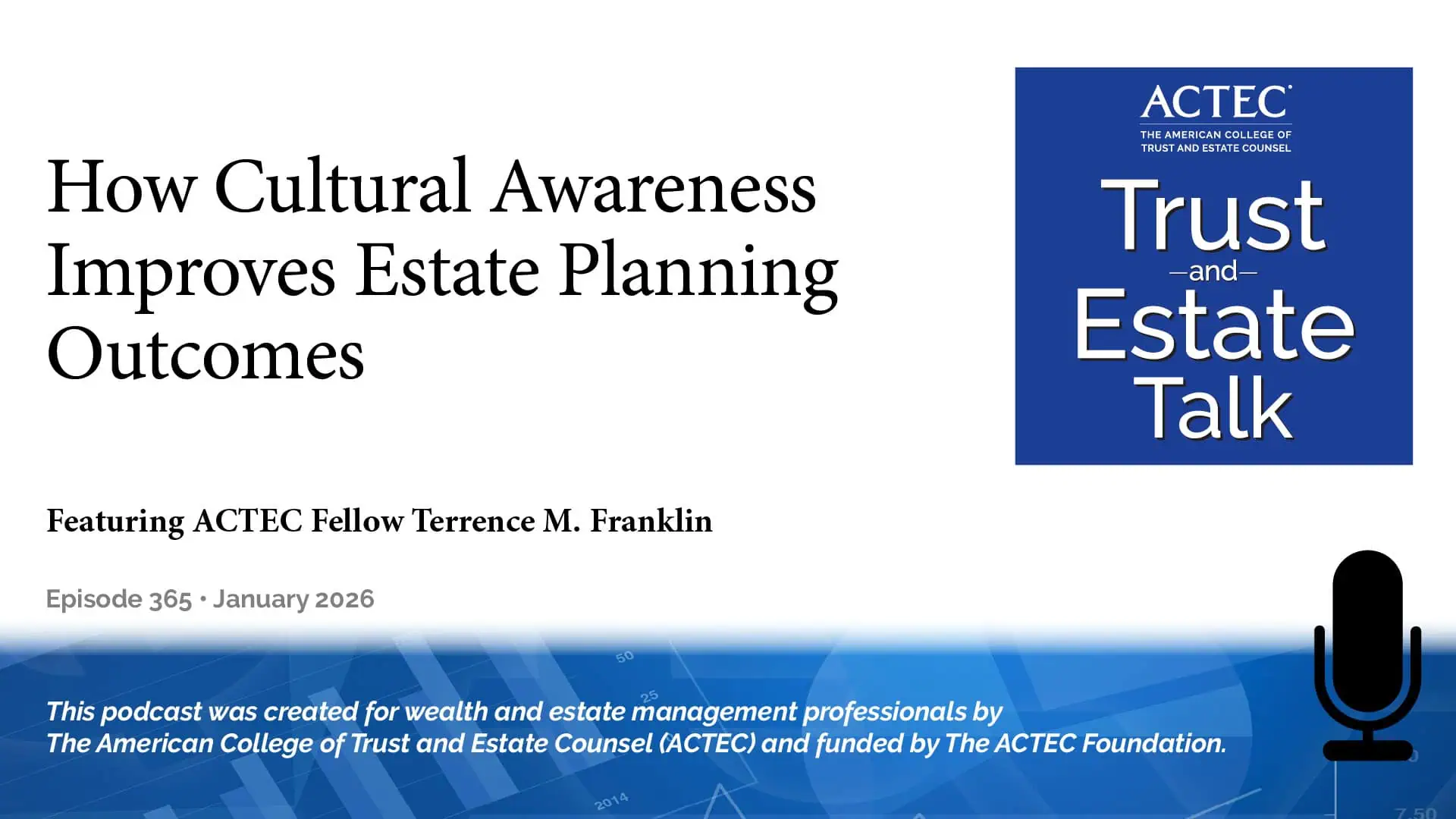Witness Depositions of Valuation Experts
“Witness Depositions with Valuation Experts,” that’s the subject of today’s ACTEC Trust and Estates Talk.
Transcript/Show Notes
This is Connie Eyster, ACTEC Fellow from Boulder, Colorado. This program will provide insight into strategies and best practices for taking and defending the deposition of an expert witness. Guest Carsten Hoffmann, head of the trust and estate group of Stout Valuations in Irvine, California, a valuation expert, who frequently serves as an expert witness, will share his deposition recommendations. Welcome, Carsten.
Hi. Thank you very much. This is Carsten Hoffmann. I had the pleasure of giving this presentation with Stacie Nelson and Matt Triggs. And what we talked about is really best practices for a deposition. In the various areas that we covered: #1 – we talked about expert selection; #2 – we talked about preparing the expert; #3 – we talked about examining the expert; and #4 we talked about defending the expert. Everything that is key and pivotal in the course of a successful deposition. We set the hypothetical in the case of a LLC holding apartment properties in San Francisco where a valuation was done to, in essence, value an interest in the LLC.
We made the fact pattern slightly nuanced with regard to the fact that some of the apartments were held outright and some of them were held as undivided interests. So, in some cases, you had situations where rather than just one level of valuation discounts, potentially two levels of valuation discounts exist. So, we added a little bit of color to the deposition to make it slightly more interesting and to give a little bit of leeway on the Q and A. So, when it comes to expert retention, when it comes to picking your expert, what we really went into detail about was that you have to do your homework.
Selection of Valuation Expert Witness
You have to consider the locale. You have to consider the hypothetical situation. You have to consider the judge. You need to do your homework. The retention may not always be the individual with the most testimony experience on their resume. It may be somebody that has specific knowledge – that has specific knowledge for the case that is unique to the locale. So, do your homework on retention. Another point, not as relevant, but practical availability of the expert. A lot of depositions have moved to Zoom, so it may not be as much of an issue, but my co-presenter certainly pointed out that picking an expert that has the availability, and the geographic availability to be there, is extremely important.
You also want to understand the expert’s use of the system. Most experts will use the team to execute their valuation and it’s very important to make sure you understand how they will be using those assistants. Nothing is more frustrating than potentially ending up in front of a jury or a judge or the case of a deposition, in front of the opposing attorney, and having to admit that your expert did not put in the required hours to fully understand the matter but relied on various associates and other folks at the firm that may not be there to testify. Of course, we also talked about very important communications with the expert and understanding Federal Rule 26.
Discovery and Communication with Valuation Expert Witness and Federal Rule 26
Federal Rule 26 sets the stage for how you can communicate, what is discoverable. That is a key that both parties understand it, and both parties set the ground rules on establishing how this should be handled. How draft reports are handled. Are you only speaking on the phone? Are you emailing? Are you using shared screens for sharing draft reports? All of those things are extremely important as far as communication is concerned.
We also demand from the expert that they take ownership of the report. We talked about the short example of hours spent on the assignment. It is pivotal that the testifying and the deposed experts take ownership of the report. You also want to explore any weaknesses in the opinion and set those up.
You want to make sure that they know all of their prior testimony because in the depo they will probably be drilled on prior testimony. They need to be very familiar with any other publications and writings because, if they are not, they may be turned around on something that they wrote that might not be aligned with their current testimony. You want to make sure that you practice with your expert. Go through hypotheticals and of course, cover all of the ground rules. All are very important in preparing. Next, we talked about examining the expert. You need to have a plan to examine the expert. You need to know the big picture and where you are headed and where you think the deposing attorney is headed.
Preparation of Valuation Expert Witness
So, what is the goal of the deposition? It’s generally believed that you can’t win a deposition. You can only lose a deposition. So, it’s very important to have a plan and also if you are examining the other expert, use your own expert to potentially help them prep you as the attorney for taking the deposition of the other expert. We talked about the fact that you probably don’t want to go in overly offensive – overly aggressive – because you may immediately look like the bad guy if you’re the attorney. So, I think you want to go in with a measured amount of aggressiveness in order to hit the right target. We also talked about defending the expert deposition. So, you need to understand your options.
For example, if there are mistakes – if the other side points out mistakes – it is very important that you have trained with your expert to say, “yup, that is a mistake and we can correct it.” Only answer the question that is asked. You don’t have to elaborate. You don’t have to be in a situation where things are taken out of context. You also want to make sure that you take breaks at the right time in order to give your expert a chance to recover and regroup. So, all of those were some of the matters that we discussed with regard to the basics.
The “Do’s” and “Don’ts” of Expert Witness Communication
The next thing that we moved onto was really the “do’s” and “don’ts.” And this is a little bit of a summary of some of the points that we already talked about. So, for example, on the “do’s” and “don’ts” expert tips – do try to limit memorializing opinions and theories in writing. Have the expert keep them to actual reports. You don’t want to put – this is something that we talked about earlier – don’t want to put anything in writing that you don’t want to see on the big screen later. Do keep communication with experts about facts and data separate from analysis and impressions.
Under the federal rule, certain facts and data are handled very differently than the analysis and impressions and it’s important to understand the differences and the expert has to understand how those two will be handled. You also want to limit any communication between experts and non-attorneys. Oftentimes, an attorney may not be available, the expert may be inclined to reach out to the CPA or other professionals and you want to make sure that you completely limit it as it may very well be discoverable. Also, in court – keep in mind that the rules for federal court may be different than the rules for state court.
Don’t have your expert prepare a report, in California at least, in writing, without first discussing conclusions with counsel. Again, California has some unique rules that will potentially be even more onerous than the federal rules. So, one has to be very careful about any discussion of conclusions. And don’t assume that your communications are protected.
Now, some of the “do’s” – conduct a mock question/answer before the deposition. This goes back to the “prepare, prepare, prepare.” You want to make sure that your expert has had plenty of practice with mock questions. You also want to prep your expert to anticipate the weak spot of your analysis.
The “Do’s” and “Don’ts” of Expert Witness Depositions
Generally, it’s best to know what you’re in for before you go into the deposition. And by having a discussion of the weak points, that’s probably where most of the opposing attorney’s deposition will focus. Generally, they will not put you in your sweet spot. They will put you in some area where you are more uncomfortable and certainly the weak spot presents that opportunity. So, go ahead and discuss those weak points beforehand. Also, remind the expert to take his or her time in answering the questions to ensure that he or she answers only the question asked and allows for insertion of an objection.
You don’t want to talk so quickly or be so quick on the trigger that your attorney does not have a chance to insert an objection. Certainly, ask for clarification when needed and do not speculate on an answer or what the question or meant by a question. Always ask for clarification. One of the basic rules is always tell the truth. Even if that means that something negative will come out. There’s no point in trying to be evasive or gloss over the truth. That’ll generally just end up in a bad setting. Answer the question that is asked with a simple “I don’t know” if you don’t know the answer. Again, it does not make sense to hypothesize or try to guess what the answer may be. Do not volunteer any additional information.
Defense of Valuation Expert Witness
Also, keep in mind that it is an opportunity for the other side to try to rattle or bully the expert and you have to tell your expert to stay calm. At the end of the day, it’s their deposition and they can do whatever they want. However, it is your job to stay calm and not get particularly rattled if you are the expert. Certainly, allow yourself to take a break every hour so that it doesn’t turn into something where mentally, you might get beaten down and are more quick to answer or potentially answer questions incorrectly.
Again, as far as a “do”, make sure that your expert knows his or her bio inside and out, including all prior articles, written presentations, and even social media posts. It is very important nowadays to know all of the literature, all of the social media, everything that’s out there because a good opposing attorney will certainly have done their homework. And then the last point was to stay on message and be consistent to the core argument of the valuation. This goes back to something we talked about a little bit earlier, that you have to be clear on what is the core argument and, as the expert, make sure that you stay consistent on the message. Those were the various “do’s” and “don’ts” and that is a high-level overview of our presentation.
Connie: Thank you, Carsten, for your insightful analysis and tips for taking depositions of valuation experts.
This podcast was produced by The American College of Trust and Estate Counsel, ACTEC. Listeners, including professionals, should under no circumstances rely upon this information as a substitute for their own research or for obtaining specific legal or tax advice from their own counsel. The material in this podcast is for information purposes only and is not intended to and should not be treated as legal advice or tax advice. The views expressed are those of speakers as of the date noted and not necessarily those of ACTEC or any speaker’s employer or firm. The information, opinions, and recommendations presented in this Podcast are for general information only and any reliance on the information provided in this Podcast is done at your own risk. The entire contents and design of this Podcast, are the property of ACTEC, or used by ACTEC with permission, and are protected under U.S. and international copyright and trademark laws. Except as otherwise provided herein, users of this Podcast may save and use information contained in the Podcast only for personal or other non-commercial, educational purposes. No other use, including, without limitation, reproduction, retransmission or editing, of this Podcast may be made without the prior written permission of The American College of Trust and Estate Counsel.
If you have ideas for a future ACTEC Trust & Estate Talk topic, please contact us at ACTECpodcast@ACTEC.org.
© 2018 – 2026 The American College of Trust and Estate Counsel. All rights reserved.
Latest ACTEC Trust and Estate Talk Podcasts

Estate Planning Considerations in Community Property States Relating to Retirement Accounts
Explore how community property laws shape IRAs, 401(k)s, beneficiary designations, and spousal rights in retirement account estate planning.

When Parents Get Involved: Ethical Risks in Estate Planning and Divorce Prep
When parents join prenup or divorce planning, ethical risks follow. ACTEC Fellows explore privilege, conflicts, and protecting the attorney-client relationship.

Useful But Overlooked Trusts: A Planner’s Guide to When and How to Use Them
Explore overlooked trusts—including HEETs, alimony, voting, and blind trusts—and when estate planners should use them to address complex client needs.



